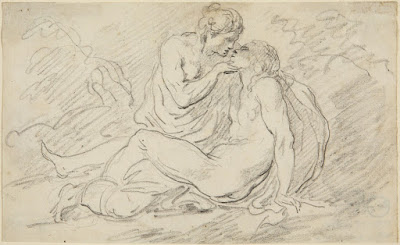 |
| Augustin Pajou after Gianlorenzo Bernini Fontana del Tritone (Piazza Barberini, Rome) ca. 1752-56 drawing Princeton University Art Museum |
 |
| Augustin Pajou after Gianlorenzo Bernini Angel with Garland (St Peter's Basilica, Rome) ca. 1752-56 drawing Princeton University Art Museum |
 |
| Augustin Pajou after Gianlorenzo Bernini Tomb of Pope Urban VIII Barberini (St Peter's Basilica, Rome) ca. 1752-56 drawing Princeton University Art Museum |
 |
| Augustin Pajou after Gianlorenzo Bernini Tomb of Countess Matilda of Tuscany (St Peter's Basilica, Rome) ca. 1752-56 drawing Princeton University Art Museum |
 |
| Augustin Pajou after Gianlorenzo Bernini Tomb of Cardinal Domenico Pimentel (Basilica di Santa Maria sopra Minerva, Rome) ca. 1752-56 drawing Princeton University Art Museum |
 |
| Augustin Pajou after Domenichino Angel with Cross (Basilica di Sant’Andrea della Valle, Rome) ca. 1752-56 drawing Princeton University Art Museum |
 |
| Augustin Pajou after Antonio Raggi Flying Angel (Chiesa del Gesù, Rome) ca. 1752-56 drawing Princeton University Art Museum |
 |
| Augustin Pajou after Antonio Raggi Angel with Banderole (Chiesa del Gesù, Rome) ca. 1752-56 drawing Princeton University Art Museum |
 |
| Augustin Pajou after Andrea Bolgi Colossal Statue of St Helena (St Peter's Basilica, Rome) ca. 1752-56 drawing Princeton University Art Museum |
 |
| Augustin Pajou after Giuseppe Passeri Two Apostles (Basilica di Santa Maria in Aracoeli, Rome) ca. 1752-56 drawing Princeton University Art Museum |
 |
| Augustin Pajou after Giovanni da Udine Two Lovers (Vatican Loggia, Rome) ca. 1752-56 drawing Princeton University Art Museum |
 |
| Augustin Pajou Antique Relief of Woman in Chiton (unknown location, Rome) ca. 1752-56 drawing Princeton University Art Museum |
 |
| Augustin Pajou Sarcophagus Relief of Silenus and Bacchante and an Antique Statue of Zeus (Capitoline Museum, Rome) ca. 1752-56 drawing Princeton University Art Museum |
 |
| Augustin Pajou Antique Statue of Jupiter, with Altar (unknown location, Rome) ca. 1752-56 drawing Princeton University Art Museum |
 |
| Augustin Pajou Antique Statue of Mercury (Giustiniani Collection, Rome) ca. 1752-56 drawing Princeton University Art Museum |
"On October 17, 1751 [Augustin Pajou] left the École [Royale des Élèves Protégés in Paris] to go to the Académie de France in Rome, where he arrived on February 14, 1752. . . . Pajou produced a great many drawings while in Rome and Naples, both from the antique and from the masters of the Renaissance, Mannerism, and the Baroque. Lavallée's comments about his friend De Wailly could just as easily be applied to him: "Imagine, if you will, a young, impetuous, ardent [Pajou], athirst for models, devoured by the need to know, to study, to compare; seeing the beauties of antiquity as Columbus sensed the New World; having only three years [the time allotted for winners of the Prix de Rome] in which to enrich himself with the magnificence of twenty centuries." . . . Pajou left Rome on June 2, 1756, carrying a letter written by the abbé Barthélemy to the comte de Caylus: "A young sculptor from the Académie de France, named Pajou, has recently left to return to Paris. I have given him a letter for you, my dear count. He did not need it; his talent alone entitles him to your patronage, but in any case I have recommended him to you."
– Augustin Pajou, Royal Sculptor, 1730-1809 (catalogue by James David Draper and Giulhem Scherf, issued in conjunction with a 1998 exhibition at the Metropolitan Museum of Art, New York)